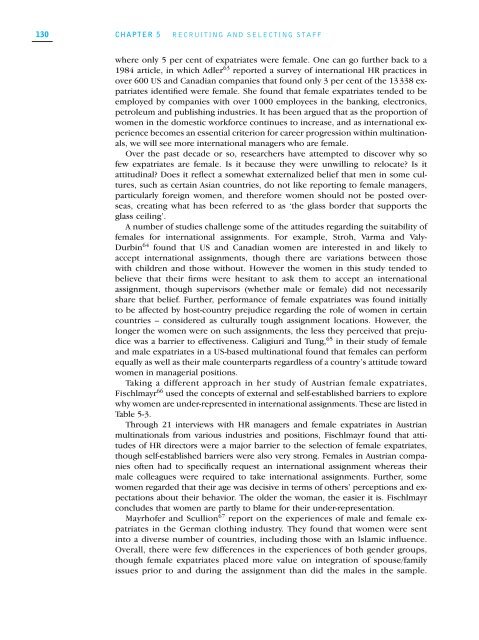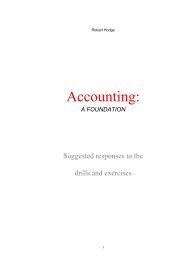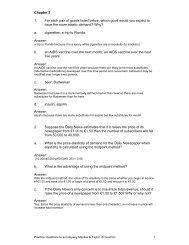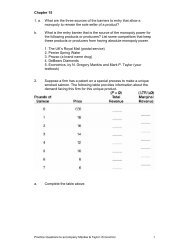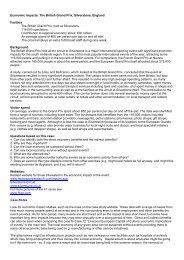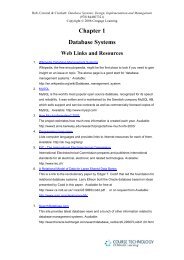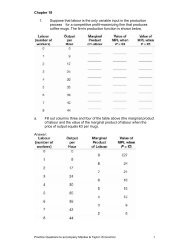CHAPTER Recruiting and selecting staff for international assignments
CHAPTER Recruiting and selecting staff for international assignments
CHAPTER Recruiting and selecting staff for international assignments
- No tags were found...
Create successful ePaper yourself
Turn your PDF publications into a flip-book with our unique Google optimized e-Paper software.
31017_05_Ch05_p109-136.qxd 9/7/07 12:15 PM Page 130130 <strong>CHAPTER</strong> 5 RECRUITING AND SELECTING STAFFwhere only 5 per cent of expatriates were female. One can go further back to a1984 article, in which Adler 63 reported a survey of <strong>international</strong> HR practices inover 600 US <strong>and</strong> Canadian companies that found only 3 per cent of the 13338 expatriatesidentified were female. She found that female expatriates tended to beemployed by companies with over 1000 employees in the banking, electronics,petroleum <strong>and</strong> publishing industries. It has been argued that as the proportion ofwomen in the domestic work<strong>for</strong>ce continues to increase, <strong>and</strong> as <strong>international</strong> experiencebecomes an essential criterion <strong>for</strong> career progression within multinationals,we will see more <strong>international</strong> managers who are female.Over the past decade or so, researchers have attempted to discover why sofew expatriates are female. Is it because they were unwilling to relocate? Is itattitudinal? Does it reflect a somewhat externalized belief that men in some cultures,such as certain Asian countries, do not like reporting to female managers,particularly <strong>for</strong>eign women, <strong>and</strong> there<strong>for</strong>e women should not be posted overseas,creating what has been referred to as ‘the glass border that supports theglass ceiling’.A number of studies challenge some of the attitudes regarding the suitability offemales <strong>for</strong> <strong>international</strong> <strong>assignments</strong>. For example, Stroh, Varma <strong>and</strong> Valy-Durbin 64 found that US <strong>and</strong> Canadian women are interested in <strong>and</strong> likely toaccept <strong>international</strong> <strong>assignments</strong>, though there are variations between thosewith children <strong>and</strong> those without. However the women in this study tended tobelieve that their firms were hesitant to ask them to accept an <strong>international</strong>assignment, though supervisors (whether male or female) did not necessarilyshare that belief. Further, per<strong>for</strong>mance of female expatriates was found initiallyto be affected by host-country prejudice regarding the role of women in certaincountries – considered as culturally tough assignment locations. However, thelonger the women were on such <strong>assignments</strong>, the less they perceived that prejudicewas a barrier to effectiveness. Caligiuri <strong>and</strong> Tung, 65 in their study of female<strong>and</strong> male expatriates in a US-based multinational found that females can per<strong>for</strong>mequally as well as their male counterparts regardless of a country’s attitude towardwomen in managerial positions.Taking a different approach in her study of Austrian female expatriates,Fischlmayr 66 used the concepts of external <strong>and</strong> self-established barriers to explorewhy women are under-represented in <strong>international</strong> <strong>assignments</strong>. These are listed inTable 5-3.Through 21 interviews with HR managers <strong>and</strong> female expatriates in Austrianmultinationals from various industries <strong>and</strong> positions, Fischlmayr found that attitudesof HR directors were a major barrier to the selection of female expatriates,though self-established barriers were also very strong. Females in Austrian companiesoften had to specifically request an <strong>international</strong> assignment whereas theirmale colleagues were required to take <strong>international</strong> <strong>assignments</strong>. Further, somewomen regarded that their age was decisive in terms of others’ perceptions <strong>and</strong> expectationsabout their behavior. The older the woman, the easier it is. Fischlmayrconcludes that women are partly to blame <strong>for</strong> their under-representation.Mayrhofer <strong>and</strong> Scullion 67 report on the experiences of male <strong>and</strong> female expatriatesin the German clothing industry. They found that women were sentinto a diverse number of countries, including those with an Islamic influence.Overall, there were few differences in the experiences of both gender groups,though female expatriates placed more value on integration of spouse/familyissues prior to <strong>and</strong> during the assignment than did the males in the sample.


